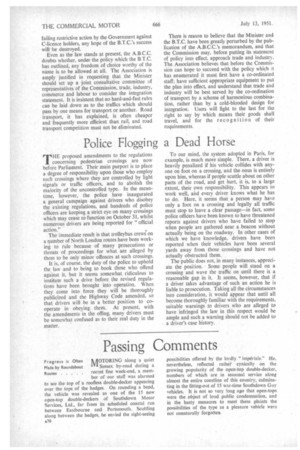Police Flogging a Dead Horse
Page 32

If you've noticed an error in this article please click here to report it so we can fix it.
THE proposed amendments to the regulations concerning pedestriae crossings are now before Parliament. Their main purport is to place a degree of responsibility upon those who employ such crossings where they are controlled by light signals or traffic officers, and to abolish the majority of the uncontrolled type. In the meantime, however, the police have inaugurated a general campaign against drivers who disobey the existing regulations, and hundreds of police officers are keeping a strict eye on many crossings which may cease to function on October 31, whilst numerous drivers are being reported for "official action." The immediate result is that trolleybus crew; on a qumber of North London routes have been working to rule because of many prosecutions or threats of proceedings for what are alleged by them to be only minor offences at such crossings. It is, of course, the duty of the police to uphold the law and to bring to book those who offend against it, but it seems somewhat ridiculous to institute such a drive before the revised regulations have been brought into operation. When they come into force they will be thoroughly publicized and the Highway Code amended, so that drivers will be in a better position to cooperate in obeying them. At present, with the amendments in the offing, many drivers must be somewhat confused as to their real duty in the matter. To our mind, the system adopted in Paris, for example, is much more simple. There, a driver is heavily penalized if his vehicle collides with anyone on foot on a crossing, and the onus is entirely upon him, whereas if people scuttle about on other parts of the road, and get hurt, it is, to a large extent, their own responsibility. This appears to work well, and every driver knows what he has to do. Here, it seems that a person may have only a foot on a crossing and legally all traffic must stop to leave a clear passage—in fact, some police officers have been known to have threatened reports against drivers who have failed to stop when people are gathered near a beacon without actually being on the roadway. In other cases of which we have knowledge, drivers have been reported when their vehicles have been several yards away from those crossings and have not actually obstructed them.
The public does not, in many instances, appreciate the position. Some people will stand on a crossing and wave the traffic on until there is a reasonable gap in it. It seems, however, that if a driver takes advantage of such an action he is liable to prosecution. Taking all the circumstances into consideration, it would appear that until all become thoroughly familiar with the requirements, suitable warnings to drivers who are alleged to have infringed the law in this respect would be ample and such a warning should not be added to a driver's case history.




























































































